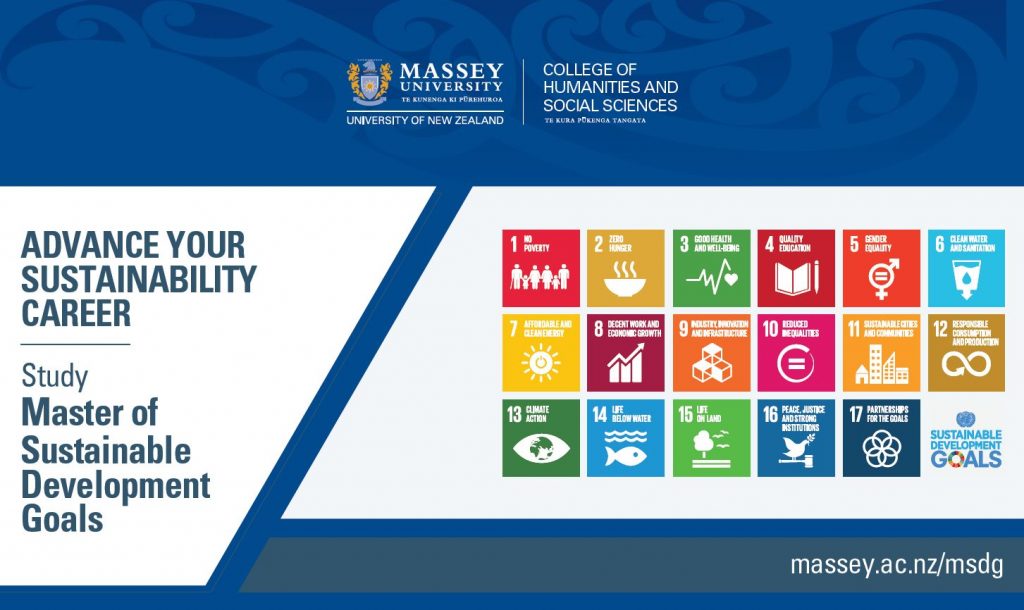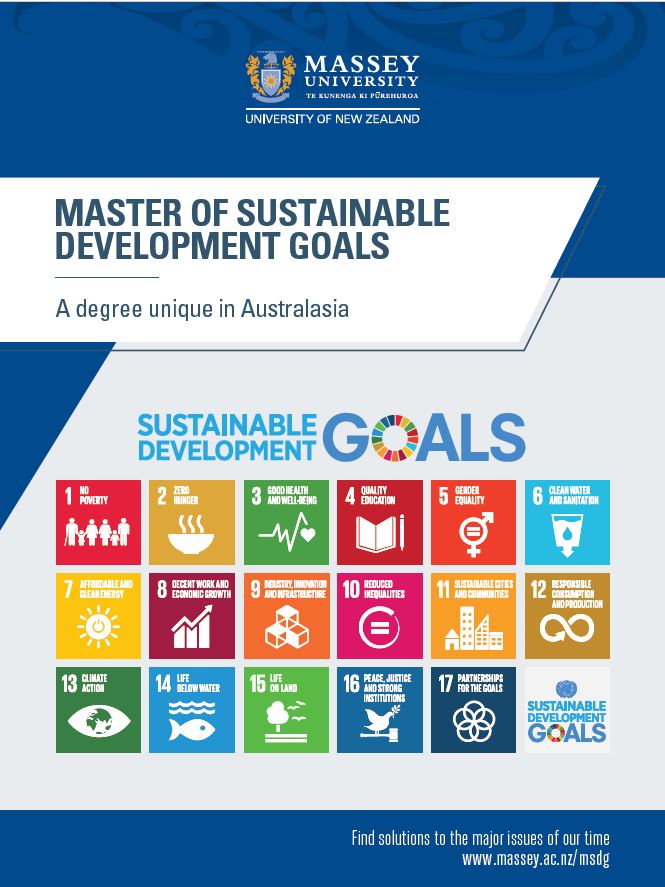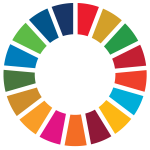Esta web utiliza cookies para que podamos ofrecerte la mejor experiencia de usuario posible. La información de las cookies se almacena en tu navegador y realiza funciones tales como reconocerte cuando vuelves a nuestra web o ayudar a nuestro equipo a comprender qué secciones de la web encuentras más interesantes y útiles.
Massey University's
Interdisciplinary Masters of the Sustainable Development Goals
Description
Institution
Massey University

Organizations/areas of the university involved
School of People, Environment and Planning, Massey Business School, College of Humanities and Social Sciences, College of Sciences
Country
New zealand
Massey’s Masters of the SDGs is an interdisciplinary degree incorporating core courses on sustainability with specializations in a broad range of disciplines including Environmental Sciences, Social Sciences, Business and Economics.
In response to the increasing need for professionals who are able to confront dynamic and complex sustainability-related problems, Massey developed a Masters of the SGDs (M.SDGs) that aims to prepare students for work internationally in a SDG-focussed world. Developed during 2019 and first implemented in 2020, the M.SDGs is an interdisciplinary degree program, which aims to equip students with SDG-related skills and knowledge. The 18 to 36-month Masters program incorporates core theoretical and practical subjects with cross-discipline specializations in fields such as business, economics, environmental science, disaster management and global development and security. This structure provides students with a common core understanding of sustainability and the SDGs,an opportunity to specialize across in their chosen field and an applied practical element incorporating theory and practice of the SDGs. The MSDGs is designed to cater for both full time and part time students, as well as providing options for both on campus and distance learning. In this way, we hope to reach our audience that extends from recent graduates to those currently working in the field.
The Masters programme was designed by a group of academics from the School of People, Environment and Planning, Massey University. From the outset, the aim was to create an interdisciplinary degree that utilised expertise and knowledge from a variety of disciplines across across all disciplines within the University. Interested colleges and schools across the University met to discuss the design and implementation of the M. SDGs, allowing for extensive collaboration and conversation between disciplines. An initial 4 specialisations were chosen: Environmental Sustainability, Global Development, Business Sustainability and Disaster Management. Once the structure of the degree was established, the proposal was submitted to the in-house University process and, once approved, to the New Zealand Universities CUAP process. Once the degree was approved, an intensive marketing strategy was implemented. Each year new specialisations will be added to the degree. In 2022, two new specialisations ‘Peace and Security’ and ‘Economics for Sustainability’ will be offered on the programme. It is envisioned that in 2023 Education and Global Health will be added as the following two new specialisations.
Results and impact measured or expected
In 2020 our first cohort of 32 students enrolled, which was followed with an additional 23 new students in 2021. Currently, most of the students are Domestic New Zealand students who work full time and have opted to take the course via Distance using the Online Teaching Platform as a part-time student.
Our students have a diverse range of backgrounds and current professions from all sectors of society, including business, education, environmental management, agricultural sciences, government and NGOs. Most chose the MSDGs as they were wanting a specific qualification in the SDGs, allowing them to incorporate the SDGs into their current professions. Over 90% of the students were new to Massey University and the top 2 reasons for choosing this degree were: 1. Wanting a degree that specifically focused on the SDGs 2. Wanting to learn more about sustainability, with an appreciation for alternative and indigenous knowledge frameworks.
Connection with the SDG framework
The M.SDGs mainstreamed the SDGs into the existing university structure providing a holistic approach to sustainable development. This provides opportunity for genuine engagement and collaboration between students and academics from previously disparate disciplines and the agility to expose students to ‘real world’ challenges; thus strengthening the research-teaching nexus.
Students are trained to think systematically about challenges such as poverty, inequality and environmental degradation from a number of disciplinary perspectives, including alternative and indigenous knowledge frameworks, encouraging critical and analytical approaches to solving complex problems. Courses are specifically framed around the SDGs, focusing on both theory and practical application. During the research practicum, students apply their theoretical knowledge of the SDGs to a real-world scenario. This structure provides students with a common core understanding of sustainability and the SDGs, an opportunity to specialise across in their chosen field and an applied practical element incorporating theory and practice of the SDGs.
Barriers and follow up
Increasingly, civil society, government and the private sector will require graduates equipped for understanding content and context, the ability to embrace a diverse range of knowledge frameworks (mainstream, alternative and Indigenous) and the skills of measuring and monitoring progress towards the SDGs. In response, the MSDG qualification represents a pivotal contribution to the development of highly relevant, thematic focused, interdisciplinary qualifications in which key transferable skills are developed through strong theoretical grounding and real-world application. This was achieved through the 3-part structure: core courses, specialisation theory and the Research Practicum. The core courses provide an advanced understanding of the SDGs incorporating both theoretical and practical knowledge and skills. Each specialisation equips students to apply the SDGs within their specific context. Finally, during the research practicum students are placed within a relevant organisation or agency, providing opportunity for students to engage in the tension between theory and practice.
Transferability of the initiative
The structure of this degree allows for cross-university collaboration on the specialization level. For example, Massey is currently working collaboratively with Wageningen University in the Netherlands to create a cross-university specialization for the M.SDGs on Sustainable Food and Agriculture.
The initiative is transferable to other HE institutions, and could be replicated. Possibly the most important logistical lesson to share is the importance of determining where responsibility for the degree sits, as the degree is housed within one College but offers specialisations from various colleges across the University. At Massey, this has been managed by a staff member dedicated to the co-ordination of the programme, based within the Academic department offering the core courses and holds the ultimate responsibility for the efficient running of the degree programme. It is essential that this coordinator maintains constant communication with the lead staff members for each of the other specialisations.
Education 4 SDG funciona gracias a WordPress


